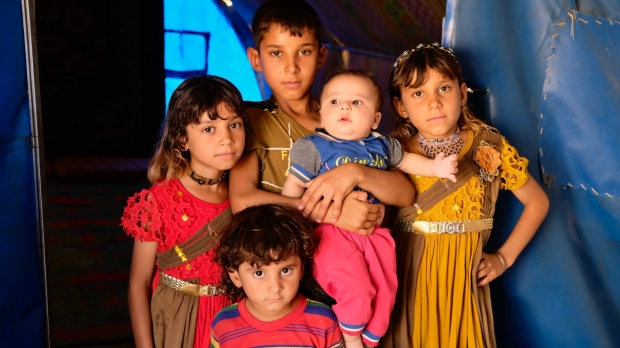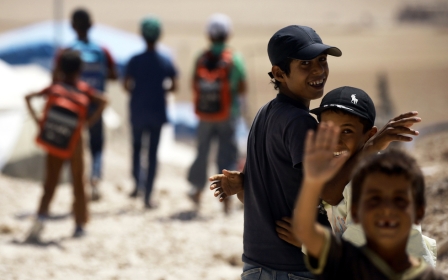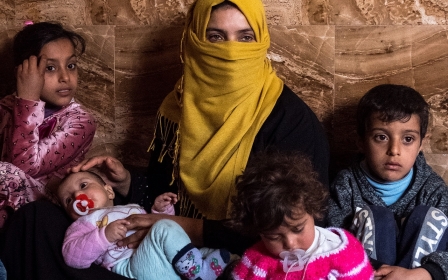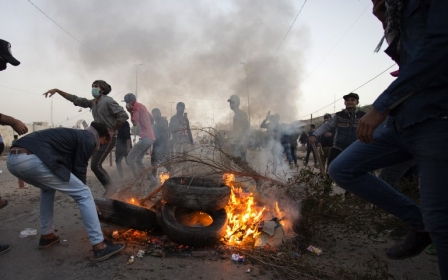Presumed guilty: The suspected IS families in Iraq blocked from returning home
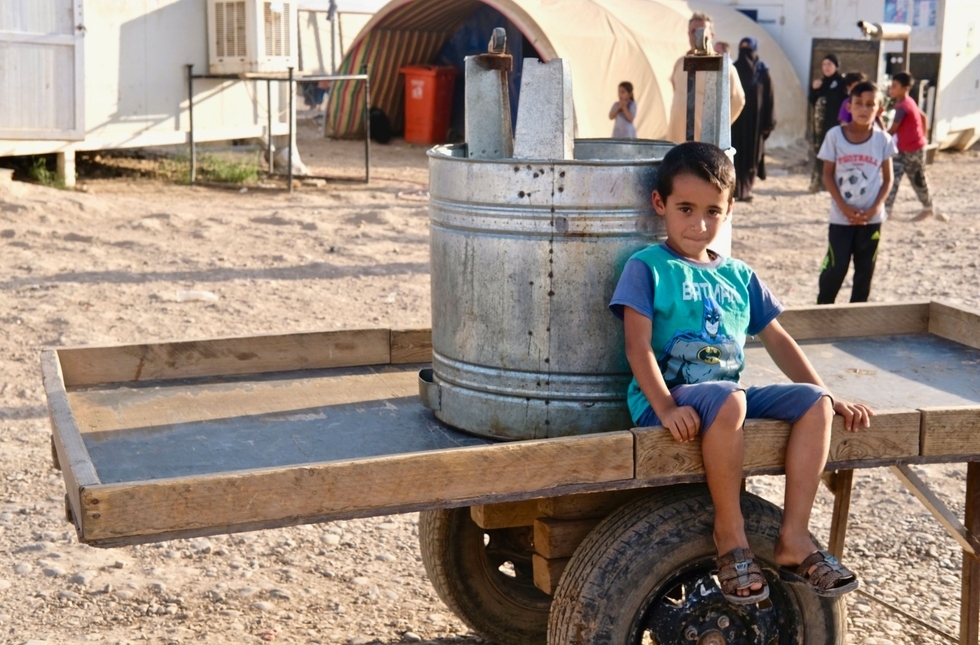
HAMAM AL-ALIL, Iraq - At a camp for displaced Iraqis just south of Mosul, Intisar sits on a thin, well-worn mat inside the mostly bare tent she now calls home.
Life has been difficult since she arrived to Hamam al-Alil just over a year ago with five children in tow.
“The other kids yell at mine, ‘dwaesh, dwaesh’. It really bothers me,” Intisar told Middle East Eye, referring to a commonly used term for members of the Islamic State group (IS).
But it’s not just the children in the camp who view her family with suspicion.
Intisar, who requested her last name be withheld to protect her family, said that the Iraqi government has prevented them from returning home to the al-Tanek neighbourhood of Mosul because of accusations against her husband, an imam arrested on terrorism charges.
New MEE newsletter: Jerusalem Dispatch
Sign up to get the latest insights and analysis on Israel-Palestine, alongside Turkey Unpacked and other MEE newsletters
“They should only have the right to judge the men who joined the Islamic State,” Intisar said. “Not their families.”
Suspicion of Sunni Muslims has become widespread in the wake of the militant group’s defeat in Mosul and other cities last year.
A Human Rights Watch researcher estimated there could be well over 100,000 Iraqis whose family ties could prevent them from getting security clearances and other civil documentation
Up and down the country, camps are filled with displaced Sunni families unable to return home because their male relatives are suspected of having joined or collaborated with the group when their cities were under IS control.
While the Iraqi government does not explicitly restrict these families’ freedom of movement, it does require that they undergo a security screening process, in which their names are checked against a database of suspected IS members.
If the search comes back empty, they are given a document known as a security clearance, which allows them to return to their areas of origin.
Intisar wasn’t so lucky. When she went to apply for a security clearance, she said the officers issuing the documents told her that her husband’s name was on the wanted list, so she and her children would be rejected.
Not only is she unable to return home, but without a security clearance, Intisar can’t obtain other critical identity documents needed to access government services and move freely around the country.
Intisar is adamant that her husband had nothing to do with IS. But she also thinks that’s besides the point.
“Let's say that my husband was part of IS. Why must they judge the children?” Intisar said.
A violation of international law
Such guilt by association imposed on families like Intisar’s is a major violation of international law, according to Belkis Wille, senior Iraq researcher at Human Rights Watch.
“It’s fundamentally and inherently unfair,” Wille said. “Not only that, it goes against Iraq’s own criminal justice system.”
The Iraqi government denies putting any policies in place that would bar the return of suspected IS-affiliated families.
“Our instructions are very clear when it comes to that,” a senior official with Iraq’s national intelligence service told Middle East Eye on condition of anonymity.
“We wouldn’t restrict the movement of any person based on the wrongdoing of a member of their family.”
But interviews with aid workers and lawyers assisting internally displaced persons (IDPs) reveal this is a major concern in the camps, currently home to roughly half a million Iraqis.
“Getting documentation is one of the most common challenges,” said Mariwan Omer, a lawyer working in Iraq with Swedish humanitarian aid organisation QANDIL.
“[They] complain about being deprived of documents just because of accusations against one of their family members.”
Based on the number of people detained for IS affiliation, Wille estimated there could be well over 100,000 Iraqis whose family ties could prevent them from getting security clearances and other civil documentation.
“In Baghdad there’s a complete denial that this is happening,” Wille said. “That being said, this is systematically happening.”
The risk of an IS resurgence
Beyond the legal questions raised by what rights groups are calling collective punishment, preventing families from returning home risks reopening old wounds among Iraq’s Sunni population, which has long complained of marginalisation at the hands of the country’s Shia-led government.
The collective suspicion of the country’s Sunnis has drawn comparisons to Iraq’s controversial de-Baathification programme, a sweeping purge designed to weed out Saddam Hussein loyalists after the American invasion in 2003. The campaign left many Sunnis feeling disenfranchised, and their resentment helped fuel the insurgency.
“Reconciliation is critical,” said Osama Gharizi, regional programme manager for Middle East programmes at the US Institute of Peace.
Gharizi warned that if reconstruction efforts only focused on repairing the physical damage left behind by IS without also tackling political and social concerns, another round of violence was likely.
“If Sunni grievances related to political marginalisation are not adequately addressed,” Gharizi said, “it may give rise to another extremist group claiming it can protect the community.”
Fear of reprisals
Even if they could leave, many displaced Iraqis are afraid to venture outside the camps. Forced evictions, vandalised property and vigilantes await them back home.
In a 2017 survey of displaced families, the International Organisation for Migration (IOM) found that 31 percent of IDPs believed they could be victims of reprisal should they return to their areas of origin. Among Arab and Kurdish Sunnis, that percentage was even higher - 45 and 49 percent, respectively.
This is an injustice to us. It's not the mother's fault if the boys fight
- Salha, mother of a slain IS fighter
“I only want to be back in our home, but our neighbourhood is full of hatred,” said Salha, who also did not wish to be identified by her last name.
After her 24-year-old son was killed in an air strike fighting alongside IS, Salha and her daughters fled from the town of Shura, south of Mosul, to Hamam al-Alil.
Wiping away tears, Salha said she tried getting her security clearance, but was denied because her son’s name appeared on the wanted list.
“This is an injustice to us,” Salha said. “It's not the mother's fault if the boys fight.”
There is a way for some to bypass the security screening process, but it’s out of the question for most. In several courts, so-called IS families have the option of denouncing their relatives and providing information on their whereabouts in exchange for a security clearance.
According to Anas al-Saqal, a private attorney in Mosul, several of his IDP clients have informed on their relatives in order to return to their homes.
“This is not a punishment for them,” Saqal said. “It’s an act of good faith.”
An uncertain future
With nearly two million Iraqis still displaced, aid organisations are urging the Iraqi government to come up with durable solutions for those blocked from returning home.
“If people aren’t actually being charged with crimes, they need to have access and the same rights as other Iraqis,” said Alexandra Saieh, advocacy manager for the Norwegian Refugee Council in Iraq.
But as long as the security clearance process is used to limit the movement of families, Human Rights Watch’s Wille said, IS-affiliated families will continue to lack any real agency in deciding where they reside.
“It’s a matter of making sure that the government realises putting people in this situation is unlawful,” Wille said. “As Iraqi citizens, they should have the right to settle wherever they want to in the country.”
With each day that passes in Hamam al-Alil camp, Intisar grows more isolated and less hopeful she’ll ever get the papers she needs to settle elsewhere.
“I feel like I’m living in prison and serving a life sentence,” Intisar said.
This article is available in French on Middle East Eye French edition.
Middle East Eye delivers independent and unrivalled coverage and analysis of the Middle East, North Africa and beyond. To learn more about republishing this content and the associated fees, please fill out this form. More about MEE can be found here.


